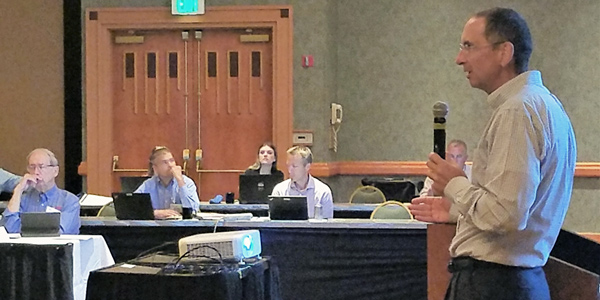By Tom Kleckner
OMAHA, Neb. — SPP’s Markets and Operations Policy Committee last week agreed to create a task force to evaluate a proposal that would change the recovery mechanism for the RTO’s administrative fee.
Saying the RTO’s Finance Committee “is at a point where maybe we change the recovery methods,” SPP CFO Tom Dunn pitched the committee’s recommendation to change the fee’s billing units from transmission metrics to energy metrics by charging market transactions.
The administrative fee, currently 42.9 cents/MWh, is collected under Schedule 1A of SPP’s Tariff on transmission contracts between transmission providers and customers. Point-to-point contracts are billed against reserved transmission capacity, and network service is billed against the prior year’s average monthly zonal peak.
Speaking at last week’s MOPC meeting, Dunn said regulators have issues with how some companies recover their costs, pointing to the use of historical data for current year costs and inconsistent calculations. The Integrated Marketplace has also resulted in a staff increase and additional IT costs, which have increased the costs to be collected.
“Is there a way we can eliminate or mitigate issues utility customers are having with regulators?” Dunn asked.
He said using energy metrics could potentially reduce the administrative fee to 15 cents/MWh, because financial-only players who are currently not paying Schedule 1A fees would also be contributing. But Dunn also cautioned against adding the “new universe” of market participants.
“From an SPP Inc. standpoint, that’s not necessarily ideal,” Dunn said. “Our customer base is monopolistic entities carrying investment grade ratings. When you change that mix, you slightly change the credit outlook of SPP — slightly.”
The new scheme would also result in independent power producers paying more.
“The value that members and market participants realize in the marketplace comes through in terms of the energy cost customers pay,” said Board Chair Larry Altenbaumer, who also sits on the Finance Committee. “The largest cost component is the 1A fee, which is easy for regulators to lay their eyes on. Our recommendation basically does an automatic netting and captures the energy cost the consumer pays. Some regulatory agencies, we think, would allow this to pass through. Others we’re not clear on.”
Dunn said he had talked with MOPC leadership about setting up a task force, noting that full market participation would “result in a solution that’s tenable for everybody.” The group would return to the committee in January with a recommendation for approval, with the new fee going into effect in 2020.
SPP legal counsel visited with FERC in March and “talked through the concept,” Dunn said.
“FERC’s big concern is consistency across the markets,” he told members. “All of the organized markets have an unbundled rate structure. We don’t want to be put in a position where we’re showing the commission was wrong to put unbundled rates in regulated markets. It’s an issue we would have to address.”
Some stakeholders expressed concerns about forecasting energy usage, which is largely impacted by weather.
“I’m not sure how that brings stability to the administrative fee and cost recovery,” said Midwest Energy’s Bill Dowling.
Dunn responded that energy metrics would improve load forecasts, as market participants would be using 365 data points for each entity, as opposed to 12 data points from the previous year. He added that the methodology change would allow midyear adjustments to true up the remainder of the year should there be under- or over-recovery.
“The simpler we can do it, the better it is for everyone. We don’t want to focus on precision so that we gin up another Z2,” Dunn said, referring to SPP’s troubled method for assigning financial credits and obligations for sponsored transmission upgrades.
“What’s beneficial is keeping rate decisions simpler. We want something that doesn’t drive administrative costs and is easier to administer,” he said.
MOPC Chair Paul Malone, of Nebraska Public Power District, recommended the task force meet monthly.
“Continuing to lay everything on transmission doesn’t make sense to me on the surface,” he said.





